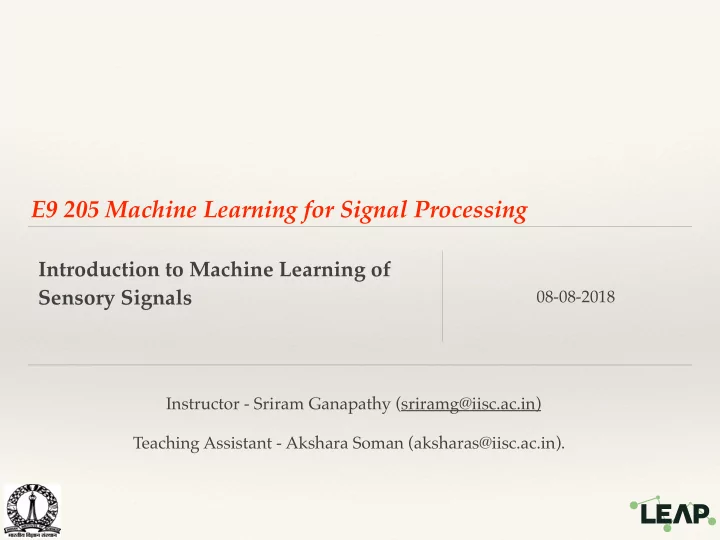

E9 205 Machine Learning for Signal Processing Introduction to Machine Learning of Sensory Signals 08-08-2018 Instructor - Sriram Ganapathy (sriramg@iisc.ac.in) Teaching Assistant - Akshara Soman (aksharas@iisc.ac.in).
Feature Extraction ❖ Feature Extraction ❖ Using measured data to build desirable values. ❖ Attributes of the data that are informative and non- redundant. ❖ Resilience to noise/artifacts. ❖ Facilitating subsequent learning algorithm.
Feature Extraction ❖ Representation Problem Cartesian Coordinates Polar Coordinates
Feature Extraction Scope for this course I. Feature Extraction in Text. II. Feature Extraction in Speech and Audio signals. III. Feature Extraction for Images.
Text Modeling - Introduction to NLP ❖ Definitions ❖ Documents, Corpora, Tokens (Terms) ❖ Term Frequency (TF) ❖ Collection Frequency (CF) ❖ Document Frequency (DF) ❖ TF-IDF ❖ Bag of words model
Text Processing
Example [Manning and Schutze, 2006] https://nlp.stanford.edu/IR-book/pdf/irbookonlinereading.pdf
Perplexity ❖ Measuring the goodness of language modeling ❖ On a Wall-street Journal Corpus https://web.stanford.edu/~jurafsky/slp3/4.pdf
Speech and Audio Processing
Speech and Audio ❖ Speech/Audio - 1D signals ❖ Generated by pressure variations producing regions of high pressure and low pressure. ❖ Travels through a medium of propagation (like air, water etc). ❖ Human sensory organ - eardrum. ❖ Converting pressure variations to electrical signals. ❖ Action mimicked by a microphone.
Sound waves in a computer ❖ Analog continuous signal from the microphone ❖ Discretized in time - sampling. ❖ Digitized in values - quantization. http://mlsp.cs.cmu.edu/courses/fall2014/lectures/slides/Class1.Introduction.pdf
Why do we need time varying Fourier Transform ❖ When the signal properties change in time ❖ DFT will only capture the average spectral character ❖ Short-window analysis can indicate the change in spectrum.
Summary of STFT Properties
Narrowband versus Wideband ❖ Short windows - poor frequency resolution - wideband spectrogram ❖ Long windows - poor time resolution - narrowband spectrogram
Narrowband versus Wideband Dan Ellis, “STFT Tutorial”
Spectrogram of Real Sounds Dan Ellis, “STFT Tutorial”
Narrowband versus Wideband Dan Ellis, “STFT Tutorial”
Mel Frequency Cepstral Coefficients
Mel Frequency Cepstral Coefficients
Mel Frequency Cepstral Coefficients
Mel Frequency Cepstral Coefficients
Image Processing
Image Capture and Representation
Image Capture and Representation
Image Filtering
Image Filtering
Edge Detection Example
Convolution Operation in Images
Recommend
More recommend